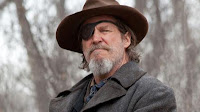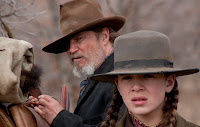This year's surprising Oscar nominee True Grit is a remake of an old John Wayne classic of the same name, unseen by me. Last time a western was nominated for Best Picture at the Academy Awards, it was Brokeback Mountain, also unseen by me, unless you count No Country For Old Men, which I don't. Granted, the Western is not the most frequented genre and there seem to be maybe one or two Westerns each year, which makes the likelihood of one being recognized by the Academy exceptionally narrow. Yet somehow this uncharacteristic submission by the Coen brothers Joel and Ethan managed to grab the attention critics as well as audiences, earning praise even from loyalists of the original film.
The original John Wayne version of the now famous film won the Duke an Oscar for his portrayal of Rooster Cogburn. Meaning no disrespect to the Duke, I find it hard to believe that even John Wayne could have done a better job with Rooster Cogburn than Jeff Bridges has done in the remake-- a performance which earned him an Academy nomination, but no gold (that honor went to worthy opponent Colin Firth for The King's Speech). That is not to say however, that Jeff Bridges did not carry off the role in superb style or was in any way undeserving of the honor of being considered for the best performance of the year.
 Bridges brings Cogburn to life with such pristine realism, one can almost smell him. Bridges portrays Cogburn with perfect dramatic and comedic timing, owning every word that slurs. He always seems to be in varying stages of intoxication or at the very least coming out of a hangover, but clearly is not without his moments of contemplation and revelation. While he starts out as merely a calloused mercenary marshal, his closing scenes reveal a deeper heart than concern for just monetary gain. Furthermore, even in his moments of seemingly drunken staggering, he effectively communicates that he is not a man to be toyed with, and has very little moral center preventing him from shooting first and asking questions later-- which he does a few times. Yet for all his lack of sobriety and seemingly careless behavior, you can’t help but care about Rooster Cogburn as he begins to care more about Mattie and her personal mission.
Bridges brings Cogburn to life with such pristine realism, one can almost smell him. Bridges portrays Cogburn with perfect dramatic and comedic timing, owning every word that slurs. He always seems to be in varying stages of intoxication or at the very least coming out of a hangover, but clearly is not without his moments of contemplation and revelation. While he starts out as merely a calloused mercenary marshal, his closing scenes reveal a deeper heart than concern for just monetary gain. Furthermore, even in his moments of seemingly drunken staggering, he effectively communicates that he is not a man to be toyed with, and has very little moral center preventing him from shooting first and asking questions later-- which he does a few times. Yet for all his lack of sobriety and seemingly careless behavior, you can’t help but care about Rooster Cogburn as he begins to care more about Mattie and her personal mission.
Part of what makes True Grit a compelling story despite its slow narrative pace is the unlikely combination of characters thrown together and rolling unsteadily along like a broken wheel. Central to the story is fourteen year old Mattie Ross, who is determined to find her father’s killer and bring him to justice. She is feisty, outspoken, reckless, and naïve in her perceptions of the world. Relatively unknown young actress Hailee Steinfeld gives Mattie Ross a controlled but passionate center that brings both emotion and humor to this trail story. Emotion because it is her drive to find her father's killer that births the story, humor because of the stark contrast she is to both Marshal Cogburn and the  ranger LeBoeuf. Mattie is obviously an earthy young woman with a simple black and white understanding of right and wrong-- a view which means that Mattie has no qualms whatsoever about shooting her father's killer if she ever finds him. Because her personal quest is (in her view) in the name of justice that failed to be carried out, she never falters or stops to wonder about the implications of killing a man. While her purpose was actually to track down Chaney and bring him to trial, she proves that she is prepared to take matters into her own hands if the situation demands it.
ranger LeBoeuf. Mattie is obviously an earthy young woman with a simple black and white understanding of right and wrong-- a view which means that Mattie has no qualms whatsoever about shooting her father's killer if she ever finds him. Because her personal quest is (in her view) in the name of justice that failed to be carried out, she never falters or stops to wonder about the implications of killing a man. While her purpose was actually to track down Chaney and bring him to trial, she proves that she is prepared to take matters into her own hands if the situation demands it.
 ranger LeBoeuf. Mattie is obviously an earthy young woman with a simple black and white understanding of right and wrong-- a view which means that Mattie has no qualms whatsoever about shooting her father's killer if she ever finds him. Because her personal quest is (in her view) in the name of justice that failed to be carried out, she never falters or stops to wonder about the implications of killing a man. While her purpose was actually to track down Chaney and bring him to trial, she proves that she is prepared to take matters into her own hands if the situation demands it.
ranger LeBoeuf. Mattie is obviously an earthy young woman with a simple black and white understanding of right and wrong-- a view which means that Mattie has no qualms whatsoever about shooting her father's killer if she ever finds him. Because her personal quest is (in her view) in the name of justice that failed to be carried out, she never falters or stops to wonder about the implications of killing a man. While her purpose was actually to track down Chaney and bring him to trial, she proves that she is prepared to take matters into her own hands if the situation demands it.
The only other character given significant screen time is Matt Damon's LeBoeuf, who serves more or less as comic relief. Not that anyone would want to push him too far, as he is a decent shot, but his general purpose here is to be the character who seems to exit the film several times, but keeps coming back to lend a hand or a laugh. The character is a little out of the ordinary for Matt Damon, but as a supporting character he lightens the mood of the scenes he has, and plays well off of Mattie and especialy Cogburn.
True Grit is by no means a shootout type of western. In terms of plot and writing it is straightforward and relatively unvarying. In this tone of storytelling, screenplay and music play in like unseen characters. Although this tale is set in the old west where saloons are plenty, social rules are blurry, and justice is a romantic dream, there is a shocking lack of grammatical blunders and conjunctions. In the entire film, even murderers utter less than a handful of words like "ain't." Every character speaks in precise tones, making most of them sound like former members of the Georgia aristocracy. For example, a character is bitten by a rattlesnake. The expected dialogue would be along the lines of "I just been bit!" with a few profanities directed at the snake. Instead, the character declares "I have been bit." On a similar note, when Cogburn and Mattie meet a travelling medicine man wearing a dead bear and carrying a corpse, he asks politely (though with a hint of insanity in his wild eyes) "Are you in need of medical attention?"
 In a story centered on travel and living off the land, one somewhat expects sweeping views of the land and memorable music to accentuate the journey of the characters across the rich American terrain. Not so here. Rather, camera shots are fairly stationary with few angles and no celebration of the scenery. As regards the music, the old hymn "Leaning on the Everlasting Arms" runs as a theme throughout most of the film; a curious but appropriate choice. The music and cinematography complement one another and carefully construct a subtle atmosphere around the story that simply works.
In a story centered on travel and living off the land, one somewhat expects sweeping views of the land and memorable music to accentuate the journey of the characters across the rich American terrain. Not so here. Rather, camera shots are fairly stationary with few angles and no celebration of the scenery. As regards the music, the old hymn "Leaning on the Everlasting Arms" runs as a theme throughout most of the film; a curious but appropriate choice. The music and cinematography complement one another and carefully construct a subtle atmosphere around the story that simply works.
In conclusion I find it appropriate to define the word grit. The word grit is synonymous with resolution, fortitude, and courage. In the early stages of the movie Mattie enlists the services of Marshal Cogburn because he has a reputation of having true grit. Cogburn appears to be no more than a washed-up fat old drunk, but by the movie's end, he has proved that he still has grit, and Mattie discovers she has a fair bit of her own. The trail is not easy, the journey is exhausting, but their own true grit pushes them through.
